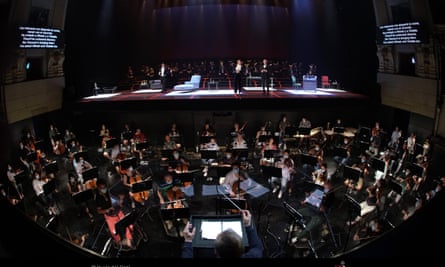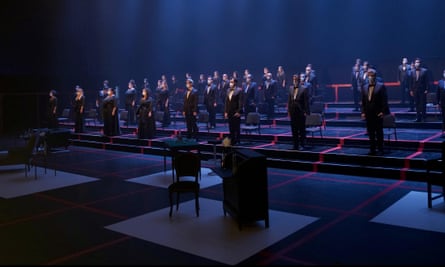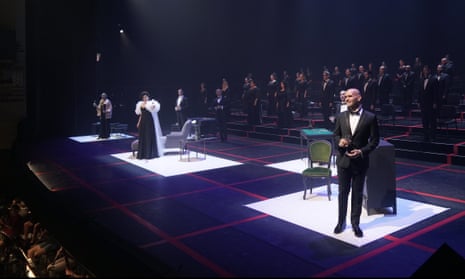The opening scenes of merriment have taken on a sombre tone, with the chorus clad in black and white and spaced exactly 2 metres apart. Minutes into the staging of La Traviata, the surgical masks come off, timed with the rising notes of an orchestra led by a conductor standing behind a plastic screen.
Spain’s Teatro Real will reopen its doors to the public on Wednesday, becoming one of the world’s first opera houses to return to the stage with a production that includes a chorus, orchestra and soloists after months of lockdown. On offer is Verdi’s La Traviata, tweaked to reflect life in the time of Covid-19.
“There are people who prefer to sit with their arms crossed and wait until we return to normal,” said Joan Matabosch, the artistic director of the Teatro Real. “And then there are theatres that prefer to try and conquer the normality that we find ourselves in.”
It is an ambitious undertaking. In mid-March, Spain was plunged into lockdown as officials scrambled to control one of the world’s fastest-spreading outbreaks. The tens of thousands of excess deaths recorded since then hint at one of Europe’s highest per capita death tolls.
The Teatro Real saw an opportunity, however, as the situation stabilised. It had originally scheduled a run of La Traviata for May and July and, given the relatively small orchestra needed for the performance, it saw it might be possible to salvage some of the season and still abide by physical distancing.
The result is a production in which every aspect – both on and off stage – is coloured by the pandemic. “This isn’t an opera staged in normal conditions,” said Matabosch. “This is an effort by the Teatro Real to actively push for a progressive return to normality.” The decision was also made out of respect for the artists, many of whom “have gone five months without earning one euro”, he added.

Every move onstage has been carefully calculated to keep soloists two metres apart. Members of the 56-piece orchestra wear masks when possible and sit 1.5 metres from each other, with plastic panels in front of the woodwind section. Artists have been asked to arrive much earlier than normal for the 27 performances, their entrances staggered to avoid any crowding and to allow them to have their temperature taken.
More than €340,000 (£310,000) has been spent gearing up for a half-capacity audience of up to 869 people, who will each also have their temperature taken before being allowed in and be required to wear a mask at all times. No-touch features have been installed in the washrooms and the intermission extended to 40 minutes to avoid crowds or long queues.
With scenes of ballroom dances, social gatherings and passionate embraces punctuating the original production, the task of redesigning the stage concept fell to the director Leo Castaldi.
The tale of La Traviata, woven through with one character’s battle with tuberculosis, seemed like the perfect opera in which to explore this disconnect. “It’s not that La Traviata is the story of an epidemic, but it’s clear that one cannot watch this opera without thinking of what we’re living through,” Castaldi said.

The production is peppered with nods to the current situation, such as the grid of red lines that divide the stage into 2-metre boxes, hinting at what Castaldi described as the psychological “imprisonment” of limited space.
The wide swaths of empty space initially proved complicated for the artists, who strained to hear each other over the metres of distance that separated them. After 10 days of rehearsal – an accelerated timeline forced by the lockdown – they adjusted.
“It’s a La Traviata that makes sense for today’s times,” said Castaldi. “And in doing it this way we discovered things. We discovered that, yes, there is distance but that music can fill this distance.”
